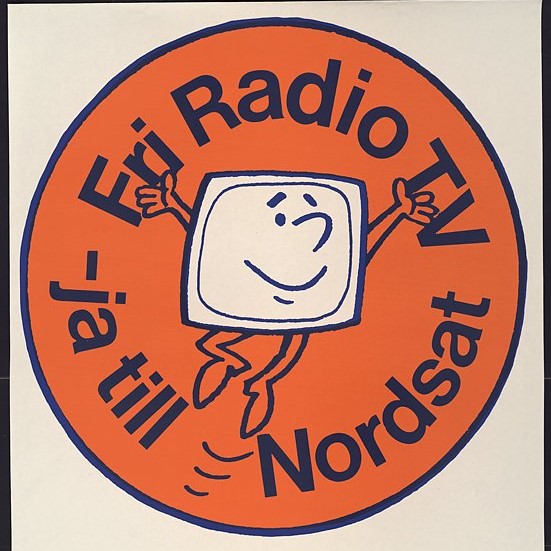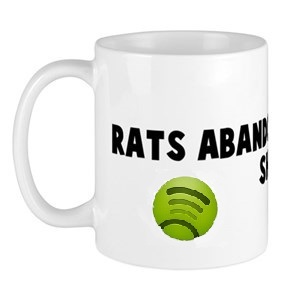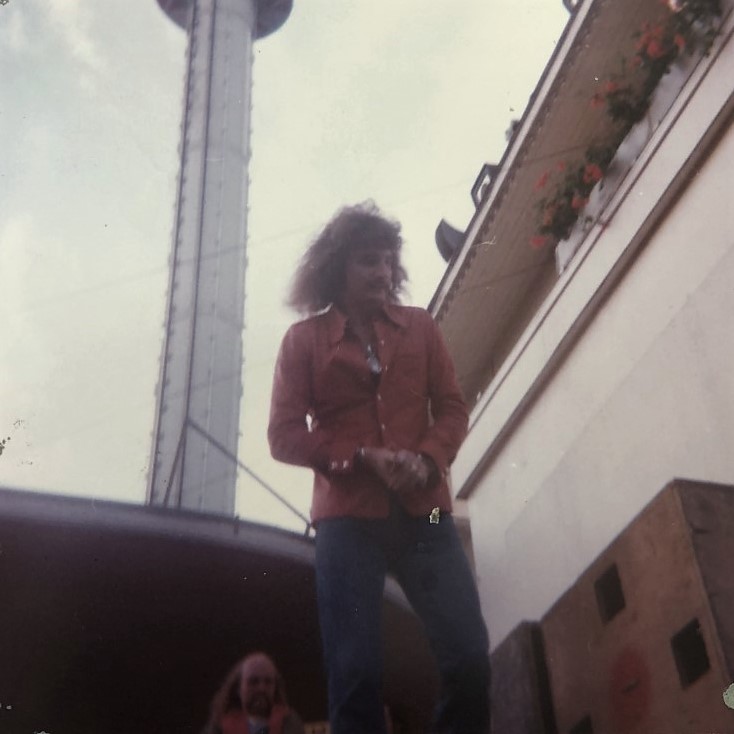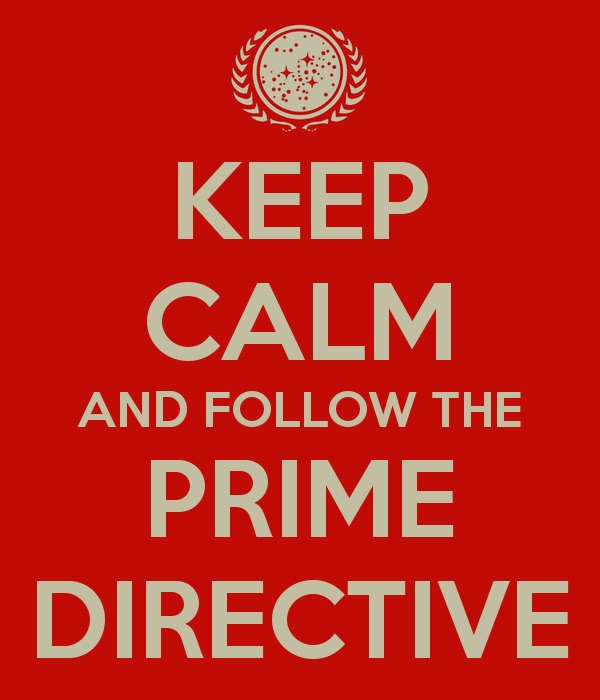 I grew with a TV and radio monopoly. We were entrusted with two TV-channels and three radio channels by our popularly elected. That was it. A had strong beliefs at the time. We were being incapacitated by our politicians. The monopoly should be deregulated. This was circa 1980. It may be hard to imagine, but during my senior year in high school I walked around in pea coat, crew neck Alan Paine cardigan, Lacoste tennis shirt, Dexter loafers and wore checkered golf pants (never held a golf club in my life). I hadn't found my inner voice, ha ha. As a political statement I wore an orange lapel pin (see image, translation: "Free Radio TV - yes to Nordsat"). The orange lapel pin requires an explanation. Nordsat was one of many collaborative projects between the Nordic countries. The idea was to let the residents in the Nordic countries take part of each other's broadcasts. However, the majority of the body considering the proposed legislation were negative. Zapping, low quality and, last but not least, the risk of being exposed to TV commercials (already allowed in Denmark and Finland) were the main arguments for saying no. The only thing that remains of the project is the Tele-X satelite. The satelite was state of the art in 1989, but became space junk in orbit in 1998. I was convinced of that a deregulation of the monopoly would mean diversity, quality and evolution. About the same time Pink Floyd’s masterpiece "The Wall" was released. In "Nobody Home", the character Pink describes his lonely life of isolation. "I've got thirteen channels of shit on the T.V. to choose from". I didn't see it coming. However, the wheels were in motion. On cold winter nights my then girlfriend (very nice and preppy) and I listened to Radio SUS (legendary student show on community radio) in her pleasant parental home by the lake. The SUS take on broadcasting was fresh, energetic and anarchistic. A couple of years later, during my university studies, I got involved in student radio. You had to save a cassette copy of the broadcast for legal purposes. Thankfully, I was never prosecuted. I tried to live up to the SUS standards. It was really fun. However, after a while I found out that there was no demand for any freshness, energy or anarchism. On the contrary, some influential people within the student radio organization exerted mild pressure. "You are supposed to play the music the record companies send us for free or otherwise they will stop sending them and we don't want that" and "We strive to make our broadcasting more professional and we will therefore set new requirements for the staff's mixing skills. Think of it as your driver license". I never played promo music or got a license. I began to see it coming. Money always beats politics. And when we do things in Sweden we tend go from one extreme to another. In short: "Now I am become death, the destroyer of worlds." Destruction came. Cable TV was introduced fast and furious. A new Swedish commercial television network, TV4, started to broadcast on the terrestrial network. And what did we get in the name of freedom of choice? Commercial breaks every five minutes, game and cooking shows, B, C and D celebrities thinking out loud, reality shows, sob-and-cry shows and a horny variant of Farmer Wants a Wife. The format was later expanded to another profession, priests. It virtually exploded in our face. The public service TV channels were contaminated by the new competition. Their mission was - and still is - public service, but it's impossible to distinguish their program selection from commercial TV. It's a race to the bottom. Rock bottom. The public service radio channels also experienced fierce competition. Human beings were replaced by cd changers and pre-recorded jingles and commercials. However, the public service radio channels have hibernated and survived by holding on to strong guiding principles. To sum it up: diversity became insularity, quality was outnumbered by quantity and evolution was overthrown by revolution. I should have seen it coming. Now I'm sitting here, remorseful, and "I've got thirteen channels of shit on the T.V. to choose from". It's possible that I subconsciously do penance by running this website. Anyway, forgive me.
I grew with a TV and radio monopoly. We were entrusted with two TV-channels and three radio channels by our popularly elected. That was it. A had strong beliefs at the time. We were being incapacitated by our politicians. The monopoly should be deregulated. This was circa 1980. It may be hard to imagine, but during my senior year in high school I walked around in pea coat, crew neck Alan Paine cardigan, Lacoste tennis shirt, Dexter loafers and wore checkered golf pants (never held a golf club in my life). I hadn't found my inner voice, ha ha. As a political statement I wore an orange lapel pin (see image, translation: "Free Radio TV - yes to Nordsat"). The orange lapel pin requires an explanation. Nordsat was one of many collaborative projects between the Nordic countries. The idea was to let the residents in the Nordic countries take part of each other's broadcasts. However, the majority of the body considering the proposed legislation were negative. Zapping, low quality and, last but not least, the risk of being exposed to TV commercials (already allowed in Denmark and Finland) were the main arguments for saying no. The only thing that remains of the project is the Tele-X satelite. The satelite was state of the art in 1989, but became space junk in orbit in 1998. I was convinced of that a deregulation of the monopoly would mean diversity, quality and evolution. About the same time Pink Floyd’s masterpiece "The Wall" was released. In "Nobody Home", the character Pink describes his lonely life of isolation. "I've got thirteen channels of shit on the T.V. to choose from". I didn't see it coming. However, the wheels were in motion. On cold winter nights my then girlfriend (very nice and preppy) and I listened to Radio SUS (legendary student show on community radio) in her pleasant parental home by the lake. The SUS take on broadcasting was fresh, energetic and anarchistic. A couple of years later, during my university studies, I got involved in student radio. You had to save a cassette copy of the broadcast for legal purposes. Thankfully, I was never prosecuted. I tried to live up to the SUS standards. It was really fun. However, after a while I found out that there was no demand for any freshness, energy or anarchism. On the contrary, some influential people within the student radio organization exerted mild pressure. "You are supposed to play the music the record companies send us for free or otherwise they will stop sending them and we don't want that" and "We strive to make our broadcasting more professional and we will therefore set new requirements for the staff's mixing skills. Think of it as your driver license". I never played promo music or got a license. I began to see it coming. Money always beats politics. And when we do things in Sweden we tend go from one extreme to another. In short: "Now I am become death, the destroyer of worlds." Destruction came. Cable TV was introduced fast and furious. A new Swedish commercial television network, TV4, started to broadcast on the terrestrial network. And what did we get in the name of freedom of choice? Commercial breaks every five minutes, game and cooking shows, B, C and D celebrities thinking out loud, reality shows, sob-and-cry shows and a horny variant of Farmer Wants a Wife. The format was later expanded to another profession, priests. It virtually exploded in our face. The public service TV channels were contaminated by the new competition. Their mission was - and still is - public service, but it's impossible to distinguish their program selection from commercial TV. It's a race to the bottom. Rock bottom. The public service radio channels also experienced fierce competition. Human beings were replaced by cd changers and pre-recorded jingles and commercials. However, the public service radio channels have hibernated and survived by holding on to strong guiding principles. To sum it up: diversity became insularity, quality was outnumbered by quantity and evolution was overthrown by revolution. I should have seen it coming. Now I'm sitting here, remorseful, and "I've got thirteen channels of shit on the T.V. to choose from". It's possible that I subconsciously do penance by running this website. Anyway, forgive me.
 Rats have been said to be the first to sense an impending disaster, such as a sinking ship. "Ship-builders" a.k.a. founders Daniel Ek and Martin Lorentzon are now selling shares worth $220 000 000. They're already filthy rich and don't need any housekeeping money. It's hard to escape the idea that they discreetly and quietly are abandoning the sinking ship. The golden rule: if the founders are selling, you shouldn't be buying. Risk capitalists and small time investors are more than willing to put their money in this project, despite it's leaky as a sieve. Spotify has never been profitable. Some stunning loss figures: 1 339 million dollar (2017), 412 million dollar (2016), 278 million dollar (2015), 182 million dollar (2014) and 100 million dollar (2013). Some business analysts believe that Spotify will be profitable in 2019. Yeah, right. When Hell freezes over! The Swedes are, despite the similarities with a pyramid scheme, impressed by Spotify's inflated success. People are drawn to this high-risk project like moths to a flame. Speaking of flames. Soon the whole shit will go up in flames. Or more likely sink and disappear below the surface. This future scenario has been elegantly put by Prospero in William Shakespeare's The Tempest: "In few, they hurried us aboard a bark / Bore us some leagues to sea; where they prepar'd / A rotten carcass of a boat, not rigg'd, / Nor tackle, sail, nor mast; the very rats / Instinctively had quit it."
Rats have been said to be the first to sense an impending disaster, such as a sinking ship. "Ship-builders" a.k.a. founders Daniel Ek and Martin Lorentzon are now selling shares worth $220 000 000. They're already filthy rich and don't need any housekeeping money. It's hard to escape the idea that they discreetly and quietly are abandoning the sinking ship. The golden rule: if the founders are selling, you shouldn't be buying. Risk capitalists and small time investors are more than willing to put their money in this project, despite it's leaky as a sieve. Spotify has never been profitable. Some stunning loss figures: 1 339 million dollar (2017), 412 million dollar (2016), 278 million dollar (2015), 182 million dollar (2014) and 100 million dollar (2013). Some business analysts believe that Spotify will be profitable in 2019. Yeah, right. When Hell freezes over! The Swedes are, despite the similarities with a pyramid scheme, impressed by Spotify's inflated success. People are drawn to this high-risk project like moths to a flame. Speaking of flames. Soon the whole shit will go up in flames. Or more likely sink and disappear below the surface. This future scenario has been elegantly put by Prospero in William Shakespeare's The Tempest: "In few, they hurried us aboard a bark / Bore us some leagues to sea; where they prepar'd / A rotten carcass of a boat, not rigg'd, / Nor tackle, sail, nor mast; the very rats / Instinctively had quit it."
 Some memories are etched on my mind. Like that time when I mistook a roadie for Uriah Heep-guitarist Mick Box. What can I say in my defense? Almost everyone had long black hair with center parting and looked like Jesus in 1975. I spent well over a quarter of a film roll on the roadie before I realized my mistake. This was analogue times and film rolls and photographic processing were expensive. You had to choose your motifs and photo opportunities very carefully. I still have a couple of photos left from the concert stored in a cardboard box. However, no photo copies exists of the roadie. I think I threw them away in a state of disappointment and embarassment. The photo on the right is taken by me with my crappy time typical Instamatic camera. The blurry-grainy photo has since then bleached over time and suffered a minor crack damage. It depicts singer David Byron, recognized for his charismatic stage presence. In May 1974 (on the same stage) he was more drunk than usual. The heel of one of his platform shoes fell off and he fell slap-bang into the orchestra pit. His seven feet headlong fall was only slightly mitigated by the flower arrangements. His drinking eventually led to him being sacked from Uriah Heep in July 1976. David Byron died of alcohol-related complications in 1985. Sad story. Uriah Heep is still active. Mick Box is the only member from the band's founding in 1969 who is still active with the group. Looking at this crappy photo brings back memories. Things were quite different back then. It was perfectly natural for children at the age of thirteen to take the commuter train 40 miles on their own to attend a rock concert. Nobody raised an eyebrow. Today you would need a support team nearby texting you every five minutes. The zeitgeist was liberal. In elementary school you were allowed to bring records to the art lessons. One fall day we were pressing watercoloured maple leafs on paper. Uriah Heep's Live (January 1973) was spinning on the turntable. Our middle-aged teacher, who previously had been listening to bands like Deep Purple, Black Sabbath and Led Zeppelin without any enthusiam, suddenly started to think out loud. "This is good. I think I will buy this album to my son". The popularity of Uriah Heep ended there and then.
Some memories are etched on my mind. Like that time when I mistook a roadie for Uriah Heep-guitarist Mick Box. What can I say in my defense? Almost everyone had long black hair with center parting and looked like Jesus in 1975. I spent well over a quarter of a film roll on the roadie before I realized my mistake. This was analogue times and film rolls and photographic processing were expensive. You had to choose your motifs and photo opportunities very carefully. I still have a couple of photos left from the concert stored in a cardboard box. However, no photo copies exists of the roadie. I think I threw them away in a state of disappointment and embarassment. The photo on the right is taken by me with my crappy time typical Instamatic camera. The blurry-grainy photo has since then bleached over time and suffered a minor crack damage. It depicts singer David Byron, recognized for his charismatic stage presence. In May 1974 (on the same stage) he was more drunk than usual. The heel of one of his platform shoes fell off and he fell slap-bang into the orchestra pit. His seven feet headlong fall was only slightly mitigated by the flower arrangements. His drinking eventually led to him being sacked from Uriah Heep in July 1976. David Byron died of alcohol-related complications in 1985. Sad story. Uriah Heep is still active. Mick Box is the only member from the band's founding in 1969 who is still active with the group. Looking at this crappy photo brings back memories. Things were quite different back then. It was perfectly natural for children at the age of thirteen to take the commuter train 40 miles on their own to attend a rock concert. Nobody raised an eyebrow. Today you would need a support team nearby texting you every five minutes. The zeitgeist was liberal. In elementary school you were allowed to bring records to the art lessons. One fall day we were pressing watercoloured maple leafs on paper. Uriah Heep's Live (January 1973) was spinning on the turntable. Our middle-aged teacher, who previously had been listening to bands like Deep Purple, Black Sabbath and Led Zeppelin without any enthusiam, suddenly started to think out loud. "This is good. I think I will buy this album to my son". The popularity of Uriah Heep ended there and then.
 I have committed myself to follow the Prime Directive. The directive prohibits the protagonists from interfering with the internal development of other civilizations in the fictional universe of Star Trek. The rules are simple. "No identification of self or mission. No interference with the social development of said planet. No references to space or the fact that there are other worlds or civilizations." Things could go wrong. Leadership role-model Jean-Luc Picard hit the nail on the head: "History has proved again and again that whenever mankind interferes with a less developed civilization, no matter how well intentioned that interference may be, the results are invariably disastrous." My wife, who is a enlightened TNG-trekker, objected to my ill-considered commitment. Firstly, the Prime Directive only apply to less developed civilizations. The gothic country genre is, of course, the highest of civilizations. Secondly, I've violated the Prime Directive constantly by contacting artists, writing articles, reviews and blog posts. And moreover. My mission statement for the website "To explore and promote gothic country, southern gothic, gothic americana, american gothic and dark americana and ...whatever" is in open and direct conflict with the Prime Directive. I got myself into a difficult moral dilemma. Captain Picard always found a way. However, my ethical dilemma was solved brutally and in a blink. The Internet Foundation in Sweden, IIS, is an independent public-service organization that acts to ensure positive development of the internet. In their annual report "Swedes and the Internet 2018" they concluded that 98 percent have an internet access and 90 percent own a smartphone. But only 1 percent runs a homepage or blog. And, even a smaller percentage visit or follow them. Apparently, I belong to a civilization which is below the threshold of technological, scientific and cultural development. I don't have to think about following the directive. The directive protects me. My mind boggles when I think about it. It's like holodeck-gone-bad plot without the episode filler feeling.
I have committed myself to follow the Prime Directive. The directive prohibits the protagonists from interfering with the internal development of other civilizations in the fictional universe of Star Trek. The rules are simple. "No identification of self or mission. No interference with the social development of said planet. No references to space or the fact that there are other worlds or civilizations." Things could go wrong. Leadership role-model Jean-Luc Picard hit the nail on the head: "History has proved again and again that whenever mankind interferes with a less developed civilization, no matter how well intentioned that interference may be, the results are invariably disastrous." My wife, who is a enlightened TNG-trekker, objected to my ill-considered commitment. Firstly, the Prime Directive only apply to less developed civilizations. The gothic country genre is, of course, the highest of civilizations. Secondly, I've violated the Prime Directive constantly by contacting artists, writing articles, reviews and blog posts. And moreover. My mission statement for the website "To explore and promote gothic country, southern gothic, gothic americana, american gothic and dark americana and ...whatever" is in open and direct conflict with the Prime Directive. I got myself into a difficult moral dilemma. Captain Picard always found a way. However, my ethical dilemma was solved brutally and in a blink. The Internet Foundation in Sweden, IIS, is an independent public-service organization that acts to ensure positive development of the internet. In their annual report "Swedes and the Internet 2018" they concluded that 98 percent have an internet access and 90 percent own a smartphone. But only 1 percent runs a homepage or blog. And, even a smaller percentage visit or follow them. Apparently, I belong to a civilization which is below the threshold of technological, scientific and cultural development. I don't have to think about following the directive. The directive protects me. My mind boggles when I think about it. It's like holodeck-gone-bad plot without the episode filler feeling.
 I found this typology of gothic branches on internet (see image right). It may contain a certain element of generalization and exaggaration. Most of the time typologies are helpful in understanding a complex world by making it smaller and more easy to handle. Definitions and classifications are useful tools in this process. However, some tools are not very accurate, for example so-called genre maps (algorithmically-generated, readability-adjusted scatter-plot of the musical genre-space). They simply make no sense. One of the reasons to why I started this website was to bring some order in the "gothic country" genre and provide basic consumer guidance. The term "gothic country" was first attached to The Shivers, a husband and wife duo who explored the back roads of America in their RV in the 1990s. But what is "gothic country"? One very elegant but general defintion has been suggested by writer David Goodman: "Extremely laid back style with an intense focus on the supernatural, death, sorrow, and other themes and images found in Southern/Gothic literature." Amen to that. However, there are many different branches and twigs in the gothic country genre and you can approach the genre in different ways. In a previous blog entry I described the regional differences, read more here (opens in a new window). You have to be careful. The use of definitions and classifications sometimes gets out of control. In some academic fields people are busy with, not with research, but with inventing conspicuous terms, constructing far-fetched dichotomies and building new models. No content, only surface. Unfortunately, the empirical data doesn't always fit. Not even with the help of a shoehorn in stainless steel. In fact, using definitions and classifications is a balancing act. One should not walk on a tightrope because, as we all know, tightrope-walkers are doomed to fall one day. However, I'm walking on.
I found this typology of gothic branches on internet (see image right). It may contain a certain element of generalization and exaggaration. Most of the time typologies are helpful in understanding a complex world by making it smaller and more easy to handle. Definitions and classifications are useful tools in this process. However, some tools are not very accurate, for example so-called genre maps (algorithmically-generated, readability-adjusted scatter-plot of the musical genre-space). They simply make no sense. One of the reasons to why I started this website was to bring some order in the "gothic country" genre and provide basic consumer guidance. The term "gothic country" was first attached to The Shivers, a husband and wife duo who explored the back roads of America in their RV in the 1990s. But what is "gothic country"? One very elegant but general defintion has been suggested by writer David Goodman: "Extremely laid back style with an intense focus on the supernatural, death, sorrow, and other themes and images found in Southern/Gothic literature." Amen to that. However, there are many different branches and twigs in the gothic country genre and you can approach the genre in different ways. In a previous blog entry I described the regional differences, read more here (opens in a new window). You have to be careful. The use of definitions and classifications sometimes gets out of control. In some academic fields people are busy with, not with research, but with inventing conspicuous terms, constructing far-fetched dichotomies and building new models. No content, only surface. Unfortunately, the empirical data doesn't always fit. Not even with the help of a shoehorn in stainless steel. In fact, using definitions and classifications is a balancing act. One should not walk on a tightrope because, as we all know, tightrope-walkers are doomed to fall one day. However, I'm walking on.
